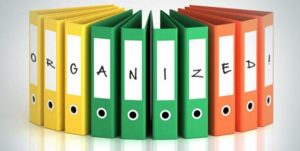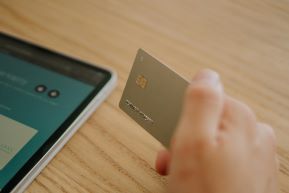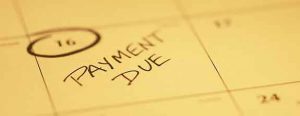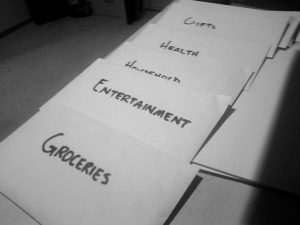
Organizing your household finances saves time and money.
A good system for organizing finances can help you avoid late fees for past due bills, keep track of your spending and savings goals, and find important documents when you need them.
This module takes about 30 minutes to complete. By the end of this module, you will be able to…
- …create a good system for organizing your household finances.
- …determine which important documents and items should be kept in a fire-proof safe, and which in your wallet or your vehicle.
- …summarize the benefits of staying organized.
Complete the following pre-learning check to test your knowledge. Answer “true or false” to the three statements below. Click on the blue box to find the correct answer.
You should not carry your Social Security Card with you. Best place for it is a secure safe at home.
True, it is best to store your original Social Security card in a safe deposit box or in a fire-proof safe at home. Storing it in your wallet increases the chance your card could be stolen. Your Social Security number is sensitive information and should only be shared when you need it for a legitimate reason. Protecting this information can help you avoid identity theft.
It is a good idea to keep a list or video of all the belongings in your home for insurance purposes and store it outside your home.
True, it is important to keep a record (ex: list, photos, video) of your personal belongings outside of your home. In case of a loss due to fire, burglary, vandalism, or other emergency your insurance company will require a list of all items lost or destroyed. Reconstructing a list from memory is often difficult.
Unfortunately, there's nothing you can do about the amount of junk mail you receive.
False, one way to reduce the amount of junk mail you receive is to “opt out” of pre-approved offers of credit by visiting https://www.optoutprescreen.com/ or contacting the Consumer Credit Reporting Industry at 1-888-5optout.
Your system doesn’t have to be complicated or cost a lot.
If you are trying to reduce spending, build savings or work on other goals, an organizational system can help you stay motivated. Sometimes the best systems are very simple. Yours might include a notebook and a set of folders; it could be a box in the closet with hanging files; it could be a few “in- and out-boxes” near the door for mail, a drawer for short term filing, a fire-proof box for storing important documents, or you can use technology like an app on a phone or tablet. Review these resources for more helpful information.
- Recordkeeping Recommendations–learn how to store documents in a way that works best for you!
- Keep important documents safe–some documents are hard to replace and they need secure, long-term storage
Click on the blue bar below for more ideas on keeping up with bills and paperwork.
Tips for paying bills on time–this saves money in late fees and is the biggest factor in improving your credit
Do your bills ever slip through the cracks? Late payments can be very costly, especially if they happen often. Late fees and interest add up. Past due accounts hurt your credit record, making future credit more expensive. While no system is perfect for everyone, it’s important to have a bill-paying system that works for you. Most people use a combination of methods. Here are a few examples…
Online Payments/Automatic Reminders

Many people prefer to pay bills online from a checking or savings account. You can set payments to be made automatically on a regular basis, or you can login to your account to pay bills as they are due.
Things to consider… Automatic and online payments help take error and guess work out of paying on time. This can save a lot of money on late fees, postage and checks along with time and hassle. It also provides an easy way to look up past payments. If you arrange automatic payments, make sure you have enough money in your account to cover those bills to avoid penalties.
Some people are not comfortable with online banking. That’s ok. Even if you don’t want to pay bills online, you can still use your computer or phone to make things easier. For example, you can use the calendar on your computer or phone to set automatic reminders for when bills are due. If you’re not comfortable using computers at all for money management and find it is easier to use a paper method, that’s ok too. The best method is one that’s easy for you and that you’re most likely to follow.
Apps

Many companies offer an app that you can download to your mobile device and begin using to track your bills with that company. While using the app, you may be able to set your bill to automatic payment on a debit or credit card or set reminders in the app to show you a notification before or when your payment is due. Also, you can consider using a 3rd party app to pay bills. These apps are not managed by the companies you pay but provide the option to manage paying your bills from just one app
Things to consider… Apps can be very convenient tools to manage and pay your bills. However, a risk to paying your bills with mobile apps is that your information may be exposed if you lose your mobile device and don’t secure it so that others can’t get into the apps on your device. It is very important to use a passcode for your phone that others can’t get easily. Also, you should set up two-factor authentication for apps that hold your private, personal information.
Paper Calendar System

Some people use a monthly calendar to help manage money. Here’s an example: Paying the Rent-On Time, Every Month from the UW-Extension Rent Smart Program. With this system, you use a calendar to record expected income and make a note of when payments must be sent in order to meet the due date. If you are tracking your spending, you can also use a calendar to record money as it is spent.
Things to consider… A calendar system can give you a good visual system for planning your payments around your expected income. For this system to work well for bill-paying, you’ll need to check the calendar often. If you use it to record money as it is spent, it can help you gain an understanding of where your money is going and when. It’s only accurate for tracking expenses if everyone takes the time to record spending consistently. Some people decide to track only those expenses they are trying to reduce. A paper calendar system doesn’t provide an easy way to look up previous expenses without paging through past calendars. So if you’d like to track past spending you may need another system.
Files/Folders/Inbox

For some people an accordion file, a folder, or a simple “in-box” or place just for bills works well. As bills come in they can be put in the in-box or filed in an accordion file labeled with the month they are due. As they are paid, most can be filed for short term storage in a file or folder for that bill.
Things to consider…While this basic system is not designed for tracking or reducing expenses, it can help keep you on top of bill paying to avoid late payments.
Notebook System

Many people use a paper notebook or ledger to plan and record income, bills and spending on an ongoing basis. There are many ways to do this successfully. Some people keep a running list of bills and due dates, checking them off as they are paid. Some people also use their financial notebook to keep track of daily spending and compare it to their spending goals. This can be helpful to prevent over-spending. How you decide to set up a notebook will depend on your goals. Is your goal to get bills paid on time? Is it to reduce over-spending? Do you have a different goal?
Things to consider… A financial notebook can be as complicated or simple as you make it. It can allow you to keep a detailed picture of cash flow and record spending all in one place. Like a calendar system, it takes frequent attention to use it successfully for paying bills on time. Using a notebook to track spending requires cooperation of others in the household who spend money.
What about envelopes…?

This system involves placing cash in envelopes or other containers marked for each expense category. For example, one envelope might be for groceries, one for utilities, etc. Bills and due dates can be included in the envelopes. As money is spent from each envelope, a running account of expenses can be noted on the outside of the envelope. The envelopes can also be used to keep receipts.
Things to consider… While some find this system helpful, it has disadvantages. First, keeping cash at home, even in a home safe, increases potential for loss or theft. Second, it takes a lot of willpower to keep yourself from spending cash meant for something else. In addition, many bills are inconvenient to pay with cash. Some people use a modified version of this approach. For example, they may use envelopes only for those expenses they are trying to reduce. This makes it easy to see when they are spending more than they intended. They manage other expenses using a different method.
No matter what system you like best, plan ahead. No system will help you pay bills on time if the money isn’t there to pay them. It’s important to plan for irregular bills, the ones that don’t come due each month. For some bills, especially those due only once or twice a year, this means planning months ahead. Many people “pay” all their bills monthly by setting aside money for them each month, even if the actual bill is only due a few times per year. More information about setting money aside in the module Make a Spending Plan.
Find your way…
There is no single “right” way to organize bill paying. Sometimes a combination of systems works best. If what you’re doing isn’t working, don’t give up. Sometimes just a few tweaks to your current system will make a big difference. The important thing is to find a way that works with your own schedule and lifestyle and that keeps your bills from falling through the cracks.
Adapted from Record Keeping for Money Management. Nebraska Extension, Kathy Prochaska-Cue, Extension Family Economist Nancy G. Frecks, Extension Educator 2009
Let’s learn more…
Watch This Video For More Tips on Financial Recordkeeping
More Information about Organizing Your Finances
- UW-Extension Tip Sheet: Organizing Your Finances
Test your knowledge
Staying Organized Quiz Take this 10-question quiz to review the basics and test your knowledge. You can take this quiz as many times as you want.
Certificate of Completion
If you’d like to certify that you’ve completed this module, be sure to contact a UW-Extension Human Development & Relationships Educator to find out about program requirements.



